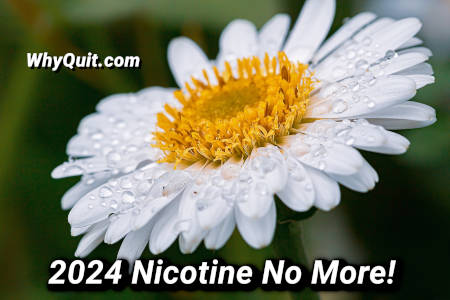Why 12 of 13 New Year's quit smoking resolutions fail
Understanding the wanting tug-o-war within and how to turn the tide
Be honest. Part of you wants to quit smoking and part doesn't. Simply put, quitting is an internal struggle between wanting to quit and wanting to smoke. But why?
Nicotine addiction is REAL drug addiction
As disturbing as this may sound, chemical dependence upon nicotine is a brain wanting disorder and mental illness that is every bit as real and permanent as alcoholism.
The vast majority of individual attempts fail because quitters don't see themselves as real drug addicts. Most believe that what they have is a nasty little habit, that someday they'll figure out how to control the uncontrollable, they'll become cured, be able to play with fire, that they'll eventually discover a way to keep their quit cake while eating it too.
It's a huge reason why so many failed quitters become so disillusioned that they end-up turning to vaping e-cigarettes. There, sadly, most vape while continuing to smoke, but even those who fully transfer to e-cigs soon begin dreaming of finding a way to quit them too.
While true that the vast majority of individual quit smoking attempts fail, far from success being unlikely or impossible, more than half of all U.S. former smokers now live as comfortably recovered ex-smokers.
So, how did they do it? What was their secret? What lesson did all those failed attempts eventually teach them?
The lucky ones eventually self-discover that nicotine dependency recovery is all or nothing, that it's one of life's few activities where being 99 percent successful results in 100 percent defeat.
In short, the reason that 92.6% of annual quitters fail is that they have yet to learn the Law of Addiction. It's a rather simple principle that if followed provides 100% odds of success.
But let's start at the beginning. What is nicotine dependency?
 Think about the wanting you feel when you get hungry or thirsty. Now, imagine the source of that wanting, your brain's dopamine pathways - your brain's wanting, urge and crave generator, and the mind's survival instincts teacher - being activated and taken hostage by nicotine.
Think about the wanting you feel when you get hungry or thirsty. Now, imagine the source of that wanting, your brain's dopamine pathways - your brain's wanting, urge and crave generator, and the mind's survival instincts teacher - being activated and taken hostage by nicotine.
Picture one puff of inhaled nicotine entering your bloodstream via lung air sacs called alveoli. Within ten seconds it arrives in your brain. There, picture it activating, saturating and de-sensitizing up to half of your dopamine pathway receptors.
Picture continuing use and saturation over the years eventually causing your brain to grow or activate millions of extra receptors in up to eleven different regions, a process known as up-regulation.
Most of us sense "wanting" for food two or three times daily. Imagine nicotine's rather short two-hour elimination half-life combining with slowly increasing numbers of receptors to leave you wanting and reaching for more nicotine 5, then 10, and eventually 15 or 20 times a day. It's a process known as tolerance.
Wanting for food, wanting for nicotine. And if too much time passes between feedings: arrival of cravings for food; arrival of cravings for nicotine. The brain's sense of normal has been altered. It now requires a specific amount of nicotine in order to feel normal.
Welcome to the addict's world of nicotine normal. But wait, there's more.
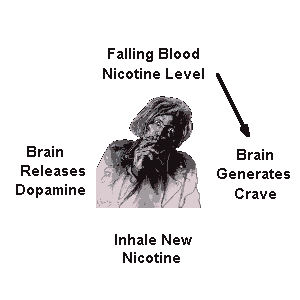 Nicotine dependency is more than an endless cycle of falling blood serum nicotine levels creating a never-ending need for more.
Nicotine dependency is more than an endless cycle of falling blood serum nicotine levels creating a never-ending need for more.
The brain's deep inner dopamine pathways are hard-wired to the conscious thinking portion of the brain, to the forehead above the eyes (the prefrontal cortex). There, they record in durable high definition memory cells each time wanting gets satisfied, and the circumstances under which satisfaction occurred.
Yes, each time nicotine satisfies wanting a durable record is made. These potent use memories force us to vividly and easily recall how to end an urge or crave. Like Pavlov's dogs, they also cue and condition the mind as to the circumstances under which a new supply of nicotine should be expected.
When attempting to quit, this pile of old use memories will decreasingly and intermittently tease and entice relapse until its influence is silenced by use cue extinguishment, time, weakened by new memories, or neutralized by reason.
Given this amazing struggle of wanting within, is it any wonder that, unless somehow awakened, half of adult smokers already know the cause of death that'll be printed on their death certificate: smoking? CDC data shows that 68 percent of 2015 smokers wanted to quit, that 55 percent tried during 2015, but only 7.4 percent succeeded.
Smoke's 4,000 inhaled chemicals include hundreds of toxins, including up to 81 known cancer causing chemicals. In that the addict's internal ongoing quit-or-smoke "wanting" tug-o-war is highly toxic, is it any wonder that each year 443,000 U.S. smokers smoke themselves to death? And each will lose an average of 13.2 or 14.5 years of life (U.S. CDC male and female smoking mortality rates).
Picture a birthday near your 60th being your last. Now, imagine an earlier smoking birthday being a point of no return, a birthday beyond which your remaining years on earth will likely be shortened or marred by one or more smoking related diseases.
Again, is it any wonder that so many failed quitters turn to vaping e-cigs? Once there, they begin getting hammered with the message that although likely far safer than cigs, that e-cigs themselves are unsafe and dangerous.
Nicotine addiction is about living a lie
Now for the good news. It is vastly more wonderful being free than your internal wanting and old use memories suggest. Without food and water we die. Without nicotine we thrive!
Contrary to years of brainwashing caused by a never ending cycle of smoking briefly satisfying wanting, smoked nicotine does not give you your edge, help you cope, define who you are, and life without it great not horrible. In fact, contrary to your dependency induced beliefs system, everything done while under nicotine's influence can be done as well or better as "you!"
Imagine coming home to a day where you go the entire day without once wanting to smoke nicotine. Is that good or bad? After the first such day, imagine such days becoming more and more common, until becoming your new sense of normal.
 Imagine a temporary journey of readjustment which transports you from the insanity of smoking a stimulant which made your heart pound up to 17 beats per minute faster prior to climbing into bed, to a calm and quiet day where addiction's chatter is replaced by the deepest sense of calm, comfort and quiet that your adult body has likely ever known.
Imagine a temporary journey of readjustment which transports you from the insanity of smoking a stimulant which made your heart pound up to 17 beats per minute faster prior to climbing into bed, to a calm and quiet day where addiction's chatter is replaced by the deepest sense of calm, comfort and quiet that your adult body has likely ever known.
Contrary to addiction's wanting within, coming home is the best New Year's gift you could ever allow yourself. Imagine knowledge diminishing or destroying fear, anxiety and panic. Imagine becoming more dependency recovery savvy than your chemical dependency is strong.
Nicotine addition is one giant lie. While the wanting felt is as real as the nose on our face, the body's need for nicotine is a lie.
Nicotine is a super toxin which has no business inside the body or brain. It's a natural insecticide which protects the roots and leaves of the tobacco plant from being eaten by insects or animals. Synthetic forms of nicotine (neonicotinoids) are the most widely used insecticides in the world.
Animal studies suggest that just two to three drops of pure nicotine (40-60mg) would kill 50 percent of humans weighing up to 160 pounds (nicotine's lethal dose or LD50). Drop for drop, that would make it more lethal than strychnine or diamondback rattlesnake venom, three times deadlier than arsenic and 166 times more toxic than caffeine.
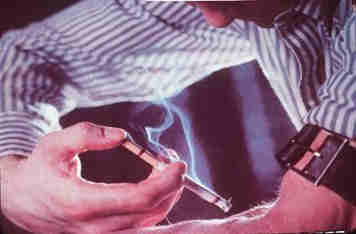 Failure to understand our wanting and captivity forced each of us to invent lies as to why we'd smoke that next cigarette. The only limit upon inventive use rationalizations was our imagination.
Failure to understand our wanting and captivity forced each of us to invent lies as to why we'd smoke that next cigarette. The only limit upon inventive use rationalizations was our imagination.
For example: flavor, pleasure, friendship, the world's finest menthol, at bargain prices, I do it all the time so I must really like smoking, I'll smoke just one, just one more pack, one more carton, one more year, I'm not much of a smoker, it's how I cope with stress, I'm less hooked than others, I really love it, I smoke to rebel, because I'm bored, it's my only vice, it makes me look cool, look more adult, my friends all smoke, I'm young, there's plenty of time to quit, I smoke for the taste, I have to die of something, my cigarettes are my friend, I've found a safer way to smoke, my genes will protect me, I smoke for the aroma, it's not like real drug addiction but only a nasty little habit, if really that deadly our government wouldn't allow cigarettes to be sold, the person I love most smokes, I'm waiting for them to quit with me, I can't quit, I smoke because I'm self destructive, I've smoked so long, what's the use in quitting now, I smoke to keep my weight down, I'll quit after I lose weight, I'll quit next week, next month, next year, my next birthday, I'll quit when ... our first child is born, when our next child is born, when my first grandchild is born, I'll keep saying that I'm quitting each New Year's!
The common thread? Each use rationalization totally ignored the real reason we smoked, because we had to, because wanting would be followed by a rising tide of anxiety if we didn't. It wasn't that we liked or loved smoking but that we didn't like what happened when we didn't.
And some of our most important rationalizations seemed to make perfect sense. For example, it's normal and logical to define what we like or love based upon what we find ourselves doing most. Such false logic goes like this: "I smoke lots and lots and lots of cigarettes, thus I must really love smoking."
Smoking, a stress reliever? Hogwash. Nicotine is an alkaloid and stress (like alcohol) is an acid generating event inside the body. The more stressed we became, the quicker remaining reserves of nicotine were eliminated from the bloodstream.
In fact, it's hard work being a smoker, as we added the onset of early withdrawal to most stressful events. Think about it, if getting a flat tire caused us stress, once we finished smoking more nicotine the tire was still flat and still needed changing.
And what about use rationalizations that thousands of store cigarette advertising signs daily pounded into our brain? For example, Marlboro's "Come to where the flavor is" signs? Did any of us really smoke for the taste of fine tobacco? How many taste buds are located inside human lungs, the place we sucked and briefly held each puff? Zero, none.
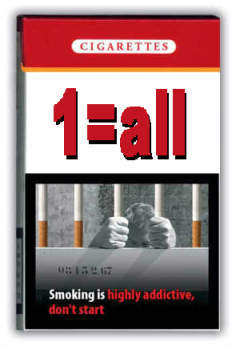 But our lies served a purpose. Who wants to look in the mirror each morning and see a real, live, honest to goodness drug addict looking back? Our rationalizations allowed us a tiny sliver of self-esteem, a way to hide the truth, the fact that we were each committing slow suicide.
But our lies served a purpose. Who wants to look in the mirror each morning and see a real, live, honest to goodness drug addict looking back? Our rationalizations allowed us a tiny sliver of self-esteem, a way to hide the truth, the fact that we were each committing slow suicide.
Coming home
There's really only one rule which if followed guarantees success. It's called the Law of Addiction, that lapse equals relapse, that we can no more have one puff than the recovering alcoholic can take one sip; that one is too many and a thousand never enough. In fact, it's impossible to relapse so long as all nicotine stays on the outside.
Brain imaging studies show that just one puff and up to 50 percent of dopamine pathway receptors become occupied by nicotine. While most walk away from trying to cheat while quitting feeling like they've gotten away with it, receptor saturation eventually wears off. Additionally, they have not only jolted and awakened their pile of old use memories, but created a new one.
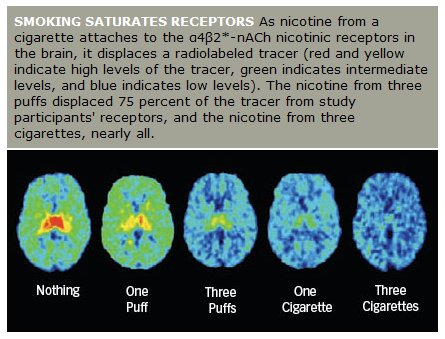
Following an attempt to cheat, it isn't long before the brain is wanting, conspiring to obtain or even begging for more. It's not a matter of weakness but the purpose, design and function of the mind's survival instincts teacher, to make pathway activating events extremely difficult to ignore.
None of us are stronger than nicotine's influence upon brain circuitry but then we don't need to be. Nicotine is a chemical with an IQ of zero. It cannot think, plan, plot or conspire and is not some monster or demon that dwells within. Our most potent weapon is our intelligence, but only if put to work. Even then, there's really only one guiding principle ... no nicotine today!
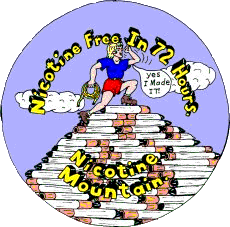 Peak withdrawal occurs within 72 of ending all nicotine use. The worst is over. By then, the body is 100 percent nicotine-free, brain dopamine receptors are re-sensitizing and the brain has started the process of down-regulating receptor numbers toward levels seen in non-smokers.
Peak withdrawal occurs within 72 of ending all nicotine use. The worst is over. By then, the body is 100 percent nicotine-free, brain dopamine receptors are re-sensitizing and the brain has started the process of down-regulating receptor numbers toward levels seen in non-smokers.
After the first three days, recovery's greatest remaining hurdle is in coming to terms with years of use lies. Success in doing so can make letting go of our destructive chemical relationship far less challenging.
Imagine an absence of the normal sense of loss felt with prior attempts. Imagine residing inside a mind that sees nothing good or positive about continued use. Imagine denial, anger, bargaining and depression being absent or diminished.
Imagine the calming effect of fully accepting that this time is for keeps, no more pretend quitting games, that at last you're done for good. Imagine relishing and savoring the thought of becoming and remaining a comfortable ex-smoker for the balance of life.
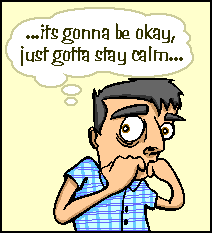 Imagine fear of quitting and the anxieties such fears generate being absent or greatly reduced. It can and does happen.
Imagine fear of quitting and the anxieties such fears generate being absent or greatly reduced. It can and does happen.
Reflect on how many times you slept through the night without wanting, or how you were able to skip or greatly diminish smoking when seriously ill. And why do so many pregnant women, and patients given "quit or drop dead" ultimatums by their doctors, report almost effortless quitting? The mind's priorities can change.
Imagine neutralizing the tease and lure of that old pile of wanting satisfaction memories by examining each under honest light. Try seeing them for what they are, as having formed the prison bars that for years kept us locked-up inside NicoTeen Prison.
Imagine retraining your mind's fight or flight panic response to correctly and honestly see quitting as safe and smoking as danger; the exact opposite as during any prior quitting attempts.
Our fight or flight circuitry sees changing the status quo as danger and sounds emotional alarms throughout the body. Sooth and calm your deep inner protective mind. Teach it this simple truth, that ending our self-destruction is good and wonderful not bad.
Knowledge truly is power. We hope you'll visit, explore, bookmark and share WhyQuit as it was built with you in mind. There, you'll find hundreds of recovery tips, including how to minimize or avoid a host of cessation side effects felt during prior attempts.
For example, blood sugar related symptoms such as an inability to concentrate, the possibility of caffeine overdose anxieties and how to minimize weight gain.
WhyQuit is commercial free, staffed entirely by volunteers, sells nothing, and declines donations. It exists to share the keys to successful cold turkey quitting. Why cold turkey? Because contrary to the average quitting product sales pitch, none of these products have yet to defeat cold turkey in any long-term real-world quitting method evaluation. It simply hasn't happened.
Take your own poll. Truth is, each year more nicotine addicts arrest their chemical dependence by quitting cold turkey than by all other quitting methods combined.
Briefly, clinical trial odds ratio victories were wins over placebo, not cold turkey quitters. Placebo quitters joined seeking free quitting products but were instead assigned to inert placebo look-a-likes. Placebo quitters with prior quitting histories became frustrated upon sensing normal withdrawal. Studies show that such trials were not blind as claimed. Also, placebo is not a real quitting method.
Have you seen Pfizer's cute and cuddly "slow turkey" Chantix commericals? Each of them opens exactly the same, "It’s tough to quit smoking cold turkey." This when real-world quitting studies shout that it's tougher to quit with Chantix, far more risky, and vastly more costly.
Like tobacco marketing, pharmaceutical industry quitting product marketing plays upon your dependency wanting within. It tries to get you to fear your natural quitting instincts, by  falsely suggesting that quitting without product use is difficult, less effective and rare.
falsely suggesting that quitting without product use is difficult, less effective and rare.
Contrary to industry marketing and the four "Guidelines" industry influence authored, cold turkey is fast, free, safe, effective and science-based.
Knowledge is power. Your 2022 New Year's stop smoking resolution need not go up in smoke. In fact, there's only one guiding principle which if followed provides 100 percent guarantee of success ... no nicotine just one hour, challenge and day at a time ... to never take another puff, dip, vape or chew! Baby steps, just the next few minutes, yes you can!
